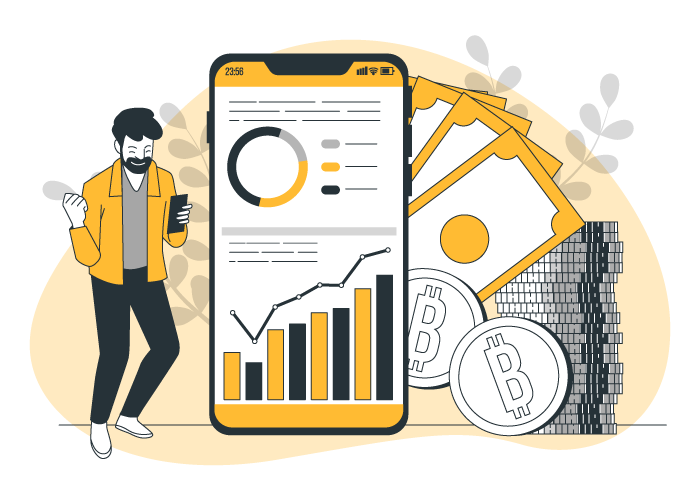How To Make Money with Cryptocurrency
In the last decade, with the entry of digital currencies into the global economy, trading in these markets has become a popular topic. Newbies and entrepreneurs are attracted by the promise of lucrative opportunities that trading in the cryptocurrency market offers. There are claims about much income and even pseudo-richness from trading in digital currencies. But can these plans be as accurate as the claims?
The income of a Cryptocurrency trader is highly variable and depends on various factors such as experience, trading strategy, market conditions, and risks associated with the Cryptocurrency market. Some people may earn significant income due to their unique expertise and knowledge in cryptocurrency trading, while others may suffer losses due to extreme market fluctuations and wrong decisions. Like any other business, trading Cryptocurrency requires planning, careful analysis, experience, patience, and risk management. Getting rich usually happens over a long period, and with continuous efforts, expecting cryptocurrency trading alone to make you rich overnight is not ideal.
In this article, we will answer more precisely the questions that are probably in many people’s minds. Here, we will also examine the concept and the facts behind the claims of getting rich by trading in digital currencies. Can the income of Cryptocurrency traders be as high as expected? Is trading in these markets alone enough to make you rich overnight? Join us as we look for answers and a more detailed analysis of these issues.
Pay attention that if you consider trade as one of your interests to follow seriously, buying a trade virtual server is one of your essential needs.
Table of Contents
- Who is the trader?
- What is trading, and how is it done in the digital currency market?
- How much capital is needed to enter the trading field?
- Different types of trading and how they work
- Traders’ sources of income
- Challenges and influential factors in traders’ income
- Essential points that traders should pay attention to
- Average monthly payment of traders
- The amount of a newcomer to the trading world
- Examining common claims about getting rich with trading and stressing the facts
Who is the trader?
Generally, a trader is an individual or a company that engages in trading and financial exchange. The term trader is an abbreviation of trader and refers to people who trade in financial markets (such as stock exchanges, currency markets, stock markets, etc.). Traders try to profit by buying and selling assets, such as stocks, currencies, futures (futures), and other financial assets.
Traders are divided into two main categories:
- Retail Traders: Ordinary and minor people who personally trade in the financial markets. They may use online platforms or financial brokers.
- Professional Traders: Individuals or companies with high expertise and experience who trade professionally in the financial markets. They may work for themselves or clients (such as investment funds).
Traders can trade based on various strategies, including technical analysis (based on patterns and charts), fundamental analysis (based on news and economic events), short-term trading (daily or weekly), or long-term trading (such as long-term investment in stocks). ).
Traders take a lot of risk because market fluctuations influence their trading results. These descriptions are valid as my knowledge cutoff date of September 2021 and may change.

What is trading, and how is it done in the digital currency market?
Trading in the market of digital currencies (such as cryptocurrencies or cryptocurrencies) means buying and selling these currencies to make a profit or exploit their price fluctuations. This process is known in the financial world as cryptocurrency trading.
The main steps that traders follow in trading digital currencies are:
Learning the essential concepts of digital currency trading
First, you should thoroughly study the basic concepts of Cryptocurrency trading. It includes technical analysis, fundamental analysis, and trading tips.
Buy a virtual trade server.
You have one choice: creating an account in a foreign exchange. You will need to buy a trade virtual server with a foreign IP. Therefore, if you intend to use foreign sales, then be sure to purchase a virtual server. In addition to providing you with a fixed external IP, our trade virtual servers also have trade-related software, making you unnecessary and making the trade process easier for you.
Create an account in an exchange.
To start trading with digital currencies, you must first create an account on the desired exchange. Some foreign businesses require identity verification procedures. However, in some other companies, you may encounter restrictions on transactions or withdrawals without needing identity verification. It should be noted that due to sanctions-related issues.
We have a less risky solution: registering and creating a user account in internal exchanges. In this method, you must also verify your identity using your national card and bank account number. With this method, you are only allowed to use your account personally, and if you transfer the account to another person, you may face problems. Note that all legitimate exchanges require authentication of their users, and it is better to use reputable websites or applications for buying and selling cryptocurrency. To make money from arbitrage trading, you should have accounts on different exchanges. Also, even for a swing strategy, creating reports on multiple platforms is recommended, especially for businesses supporting variousf currencies. This lets you choose the best place to buy or sell currency if you identify the right opportunity.
Balance deposit to exchange account
In the next step, traders should charge their trading account to start earning.
Familiarity with market analysis
Now, you can exchange your favorite digital currencies. However, it is essential to know that to trade cryptocurrencies, you need to have sufficient knowledge in the field of market analysis and a thorough understanding of market conditions. Familiarity with the principles of technical analysis, fundamental analysis, and analysis will help you on the way to trade. Most interest is usually devoted to technical analysis, but familiarity with the other two types of study will still help you improve your understanding of trading opportunities.
The cryptocurrency market is highly volatile, so it is recommended not to enter it until you have acquired sufficient knowledge. Beginners are also advised to avoid leveraged trading Because their capital may be significantly destroyed if they don’t have enough knowledge. Dollar income for traders can be attractive, but you must remember that there are serious risks, especially in leveraged trading, which may result in the loss of some or even all of your capital.
But suppose you use foreign exchanges and do not have an account in foreign banks or international payment services such as PayPal or Visa. In that case, it is impossible to withdraw money directly from the account.
Separating a part of the profit or even the entire profit as an investment is necessary. One of the critical factors that can harm traders’ profits is greed. Most people are looking for more profit and mistakenly think they should take the profit along with the capital to the following trades, but this behavior is wrong and may lead to more significant losses. It is better to separate a part of your profit and consider it as an investment or other expenses.
profit withdrawal
In successful transactions, you can withdraw your profit from the exchange account.
Finally, it is recommended to absorb enough knowledge and familiarize yourself with the possible risks before entering the digital currency trading world. Also, always pay attention to capital management and compliance with trading principles to be more productive and successful in this field.

Different types of trading and how they work
As a trading activity in the financial markets, trading has different types, each requiring own strategies and methods. Below are some of the various forms of trading and how they work:
Day trading
Day trading is the process of trading during the day. In this method, the trader is always present in the market until the end of that day if he makes buying and selling transactions in one day.
The primary purpose of day trading is to profit from the market’s daily fluctuations.
Technical analysis and using patterns and technical indicators are joint in decision-making.
Swing Trading
In swing trading, the trader seeks to exploit medium-term market fluctuations. This type of trading usually involves transactions for several days to several weeks.
Swing trading primarily aims to profit from mid-term market price changes.
Technical and fundamental analysis are used in combination.
Position Trading (Position Trading)
Position trading allows traders to hold trades for extended periods (perhaps months or years).
This type of trading aims to exploit long-term market trends and profit from long-term price changes.
Fundamental analysis and study of economic and political events influence decision-making.
Scalping
Scalping is an active strategy in which a trader makes many small trades in a short period (usually seconds to minutes).
The primary purpose of scalping is to profit from small and quick price changes.
Technical analysis and short-term charts are used to identify small patterns.
Note that each of these forms of trading has its advantages and disadvantages and depends on the needs and strategies of traders. Also, risk management and probability control are necessary for all these forms of trading to avoid unpredictable losses.
Long-Term Trading
Long-term traders act as long-term investors. They often invest in stocks or other financial assets and look for long-term growth. This strategy focuses more on fundamental analysis.
Automatic trading (Algorithmic Trading)
In this strategy, traders use algorithms and computer software to make trades. These algorithms are programmed based on precise rules and market conditions and perform transactions automatically.
Each of these strategies has advantages and disadvantages, and their suitability varies depending on the trader’s knowledge, experience, goals, and style. Also, paying attention to risk management, market analysis, and appropriate decision-making in choosing a strategy is essential.
Learning all this requires training. Without Cryptocurrency trading training, your trading path will be extended, and the probability of failure will increase.

Traders’ sources of income
The income traders earn from their trading activities is highly variable and depends on their experience, skills, trading strategies, and market conditions. Below is an explanation of the sources of income for traders:
Profit from trading
Profit is one of the primary sources of income for traders. Traders try to profit by buying currencies or other assets when the price is lower and selling them when it is higher.
Profit from price fluctuations
Traders can take advantage of price fluctuations in financial markets. In this method, traders look for short-term price changes and try to profit by making short-term trades.
Transaction fees
Some trading platforms charge traders fees for each trade. These fees can serve as a source of income for financial platforms and brokers.
Other asset management
Some traders act as investment managers and manage other people’s assets. In this case, they may profit from the profits experienced from the trades for themselves and for their clients (such as mutual funds).
Education and advice
Some traders share their experiences and knowledge with others and earn an income by providing trading tutorials, books, or consulting services.
Algorithmic trading and trading robots
Some traders design and use computer algorithms and trading robots that automatically execute trades. If these algorithms are successful, traders can earn significant profits.
At the same time, it is essential to remember that trading involves significant risks, and successful income generation requires knowledge, experience, careful analysis, and intelligent risk management.
Challenges and influential factors in traders’ income
Traders’ income is affected by a series of challenges and different elements. These challenges and factors may cause changes in the amount and stability of traders’ income. Below, I mention some of these challenges and factors:
Market fluctuations
Financial markets, especially the digital currency market, can withstand extreme price fluctuations. Sudden and robust changes can cause significant losses to traders or, conversely, bring them significant profits.
Financial risk and leverage
Using leverage in trading, although it can generate higher profits, can also increase risks, including more significant losses.
Incorrect market analysis
Incorrect analyses or lack of proper understanding of market conditions may affect traders’ decisions and lead to mistakes.
Lack of proper risk management
Traders should choose appropriate strategies for risk management. Lack of proper risk management can cause huge losses.
Inexperience and lack of knowledge
Without sufficient financial markets and trading knowledge, traders may find themselves in unfavorable situations.
psychological effect
Mental pressure, tension, and stress may affect traders’ decision-making and hurt their performance.
Trading platforms and technology
Technical disruptions in trading platforms, including internet outages or system problems, can harm traders.
Changes in rules and regulations
Changes in financial laws, market regulations, and international trade may significantly impact traders’ trading and earnings.
Unsustainable strategy
Successful trading strategies require consistency and stability. Risky and unanticipated strategy changes may lead to disruption of traders’ income.
In general, success in trading requires mastery of market analysis skills, risk management, proper use of trading strategies, experience, strong knowledge of the markets, and effective forecasting of various market factors.
Essential points that traders should pay attention to
Traders must pay attention to a set of essential issues to be successful in trading. Below are some of these tips:
Technical Analysis
Understanding and familiarity with patterns, charts, and technical indicators can help traders analyze and predict price behavior.
Using different periods to analyze charts and identify trends and entry and exit points can be useful.
Technical indicators such as RSI, MACD, Bollinger Bands, and the like helps in market analysis.
Fundamental Analysis
Understanding news and events related to markets and currencies can influence traders’ decisions.
Knowing companies’ financial analysis, earnings, profits, cash reviews, and related news can help traders make better decisions.
Risk Management
Traders must have a proper strategy for risk management. This includes setting a stop loss to protect capital in case of inappropriate market fluctuations and setting a profit target to determine the optimal point for exiting the transaction.
The use of balanced risk and proper management of financial leverage are among the critical points of risk management.
Trade Management
Continuous tracking of transactions and monitoring them to make necessary changes helps traders.
Traders must accurately track their trades and make change decisions if needed.
setting goals
Determining short and long-term goals and strategies for trading helps traders determine their direction and design and take advantage of the combination of transactions in batches.
Continuous research and education
Financial markets are volatile, and traders must be up-to-date with market developments and changes.
Traders must commit to ongoing research and education in finance, trading, and market analysis.
Self-discipline and mentality
Traders must be disciplined to avoid making erratic decisions in response to their emotions.
Experience and trial and error
Also, traders should be prepared to try different strategies and methods through trial and error and gain experience.
Finally
y, success in trading requires a combination of technical knowledge, management skills, experience, self-discipline, and careful analysis of the markets. By combining these tips and items, traders can achieve success in trading.
Conclusion
Ultimately, the issue of cryptocurrency trader income and the image that often comes with it is far from unrealistic simplifications and catchy slogans. Although trading and trading in digital currency can be profitable, getting rich is not overnight or quick. Experience, knowledge, accurate market analysis, commitment and continuous follow-up are key components of progress in this field. In other words, the income of a digital currency trader depends on the amount of effort and preparation of people in facing the challenges and risks related to this field. So, we should not expect that it is possible to get rich quickly and without effort in the world of digital currency trading.
If you have any questions in this regard, share them with us in the comments section so we can answer them as soon as possible.











